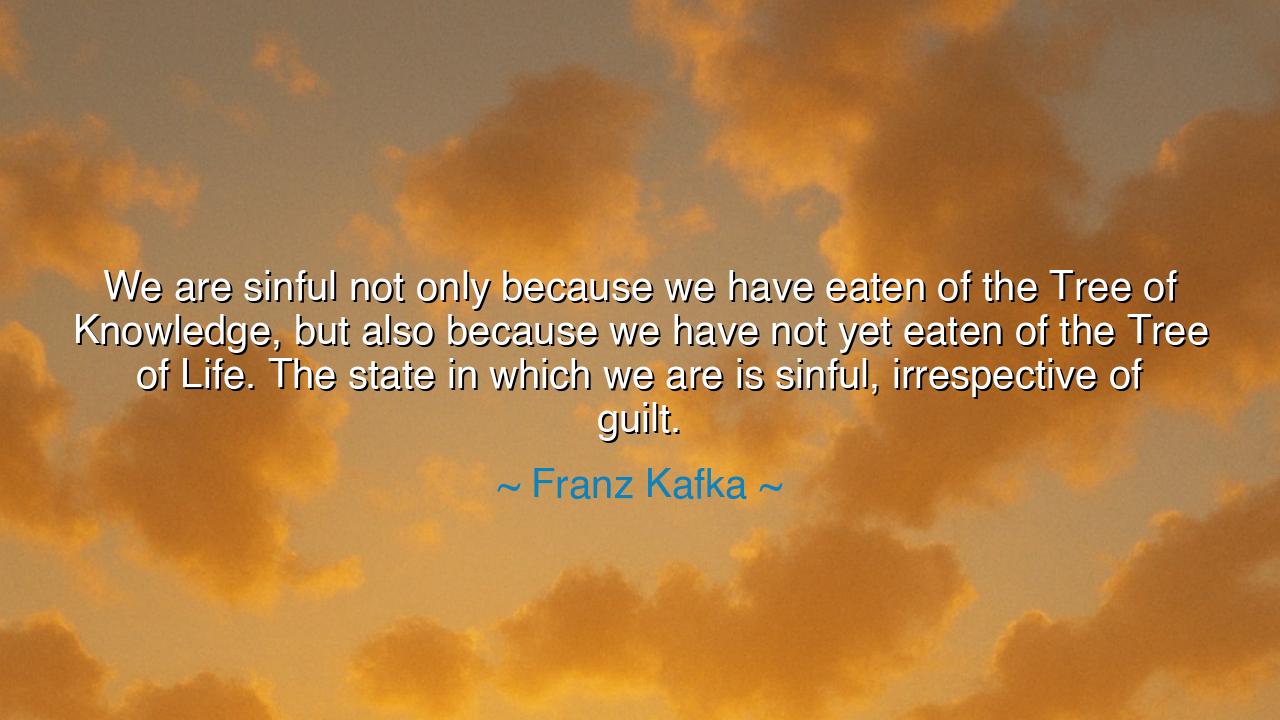
We are sinful not only because we have eaten of the Tree of
We are sinful not only because we have eaten of the Tree of Knowledge, but also because we have not yet eaten of the Tree of Life. The state in which we are is sinful, irrespective of guilt.






Hear, O children of the spirit, the dark yet luminous words of Franz Kafka, who declared: “We are sinful not only because we have eaten of the Tree of Knowledge, but also because we have not yet eaten of the Tree of Life. The state in which we are is sinful, irrespective of guilt.” These words are a riddle of the soul, a cry from one who gazed into the human condition and found it suspended between knowing and living, between longing and fulfillment. Kafka speaks not of sin as mere transgression, but as the state of separation itself—a fracture within existence, a wound that yearns for healing.
The origin of this saying lies in Kafka’s lifelong wrestling with questions of guilt, redemption, and the divine. He drew upon the ancient tale of Eden, where man, tempted, ate of the Tree of Knowledge, gaining awareness of good and evil, yet was barred from the Tree of Life, the source of wholeness and immortality. For Kafka, this was not only a story of the first humans, but the story of all humanity: we are awake enough to know our condition, yet not healed enough to escape it. Our very being is marked by this incompleteness—this is the sinful state, even apart from personal guilt.
Consider, O listener, the life of Adam and Eve after their exile. They walked the earth with eyes opened to their shame, but with hearts closed to the fullness of life eternal. They knew the weight of toil, of pain, of death, but they could not reach the fruit that would restore them. This is the paradox Kafka unveils: the knowledge we possess exposes our brokenness, but without the life that heals, that knowledge only deepens our sorrow.
Or reflect upon the story of modern man. We have eaten deeply of the Tree of Knowledge—we split the atom, we map the stars, we unlock the code of life itself. Yet the world groans still in war, division, and despair. We know more than any who came before us, yet we do not live more wisely, more peacefully, more lovingly. This is the same condition Kafka describes: knowledge without life, awareness without fulfillment, discovery without redemption. Our state remains fractured, irrespective of guilt.
Thus the teaching is not one of despair, but of recognition. To see our condition is the first step toward healing. We must admit: knowledge alone is insufficient. The mind is awake, but the heart must also be transformed. The Tree of Life stands as symbol of that higher reality—union with the divine, wholeness of being, the eternal life of love and truth. Until we partake of it, we remain in exile, bearing the weight of sin not as punishment alone, but as the essence of incompleteness.
The lesson for us is plain: seek not only knowledge, but life. Do not mistake learning for salvation, nor awareness for freedom. True wholeness comes when knowledge is joined with living wisdom, when understanding blossoms into compassion, when the mind bows before the Spirit and the soul drinks from the waters of life. Without this union, man remains restless, as Kafka himself was restless, yearning for a fullness just beyond his grasp.
Practical actions lie close at hand. Pursue knowledge, yes, but let it lead you to humility, not pride. Feed also upon the Tree of Life—through love, through service, through communion with the eternal. When you learn, act upon that learning; when you know truth, live it. In this way, the exile lessens, and you begin to taste the life for which you were created.
So let Kafka’s words echo within you: we are sinful not merely because of the fruit of knowledge, but because we have not yet eaten the fruit of life. Let this drive you not to despair, but to hunger for more—for truth that heals, for wisdom that lives, for the union of knowledge with life. For only then will humanity move from exile to home, from shadow to light, from incompleteness to wholeness eternal.






AAdministratorAdministrator
Welcome, honored guests. Please leave a comment, we will respond soon